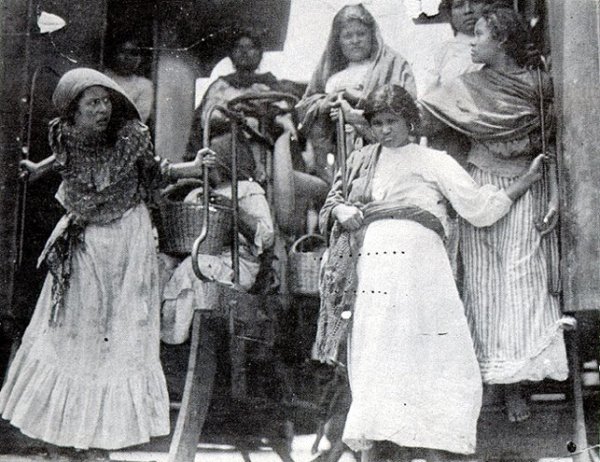|
The roles and contributions of the Soldaderas to the various armies of the Mexican Revolution were almost limitless. For both the federal army and the rebel armies, Soldaderas were used to transport goods, cook meals, set up camp sites, and carry the equipment for the soldiers. Soldaderas were said to almost always be spotted carrying cooking utensils, cooking equipment, plants and animals. (16) These chores were delegated strictly along gender lines, and thus the role of Soldaderas is very similar to that of a home maker. Serving as a home maker accompanying their husbands to war, Soldaderas were invaluable to preparing and assisting the male soldiers fighting in combat. For those female soldiers that were not married, they too found contributing to the war effort to be a worthwhile endeavor. Many functioned as “mothers” who would provide the same services of that of a wife Soldadera to an unattached man. Some Soldaderas even became prostitutes available for hire for those males in need of physical companionship. (17) In addition to their hospitality duties, Soldaderas also made other significant contributions to their armies. Following a battle, Soldaderas were used to raid the corpses of soldiers in search of valuable loot and other goods that the soldiers might find useful. (18) In the combat itself, those Soldaderas chosen to accompany the troops served as nurses. They would aid and bandage the soldiers, and even carry them back to base on oxen. (19) Finally, Soldaderas were also used as smugglers who would bring ammunition, medicine and other goods to Mexico from the United States. Soldaderas made good smugglers because American border officers did not suspect these females as having any attachment to the war, and thus were not suspicious of a Soldadera who would be hiding rounds of bullets underneath her skirt. (20) As important as they were to the armies of the Mexican Revolution, Soldaderas would not last as important figures through the end of the war. As the war effort continued, famine began to hit many soldiers, and thus the armies could not afford to waste food on Soldaderas. Also, Soldaderas were not as swift as male soldiers, and thus could not keep up with the necessary mobility of many battalions as the war pressed on. |
